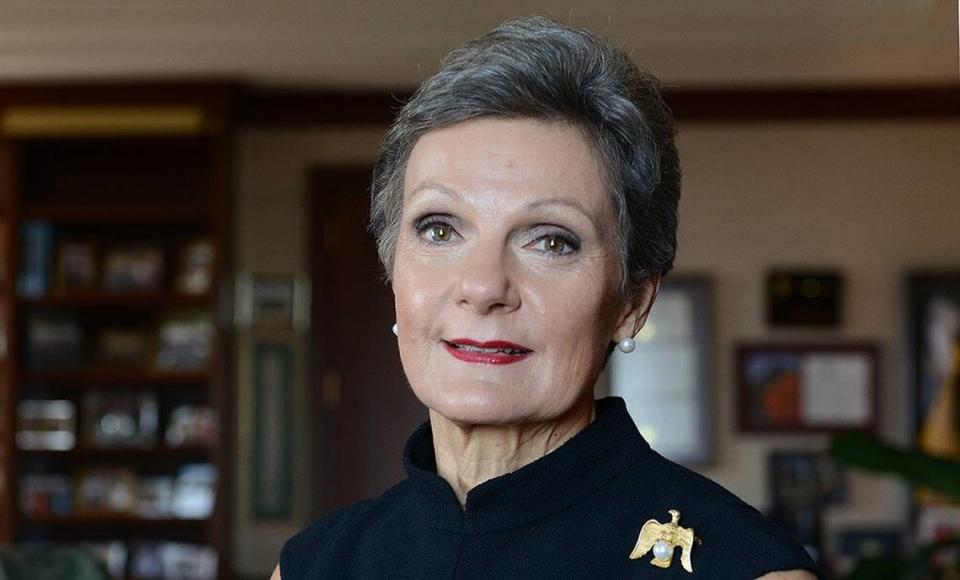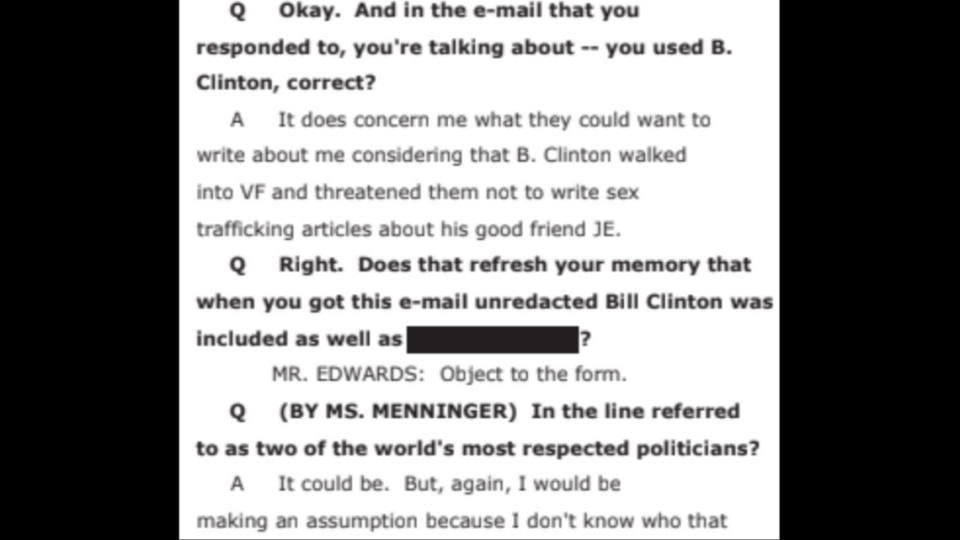Judge denies Miami Herald request to release master list of Epstein ‘J. Does’
- Oops!Something went wrong.Please try again later.
- Oops!Something went wrong.Please try again later.
As another tranche of formerly sealed court documents tied to Jeffrey Epstein was unsealed Friday, the federal judge overseeing the case denied a motion by the Miami Herald to make public a master list of Epstein “J. Does.”
The Herald argued that releasing the list — consisting of the names of all those in the Epstein-related court file except victims of the late sex trafficker — would provide transparency and that a number of unexplained name redactions in already-released documents didn’t seem to correspond with victims.
Judge Loretta Preska, in rejecting the request, noted her concern that releasing the list would violate the privacy of some individuals and create a circus of innuendo.
The records were generated by a defamation lawsuit filed by Virginia Giuffre, a victim of Epstein, against his girlfriend, Ghislaine Maxwell, after Maxwell said Giuffre was lying about sexual abuse she said she suffered at the hands of the prominent pair. The presiding judge, since deceased, ordered the file sealed. The Herald went to court asking for the seal to be lifted, arguing that the public had a right to know all it possibly could about Epstein’s sprawling sex-trafficking operation and whether famous people were being shielded from exposure.
Preska, the federal judge who inherited jurisdiction, ruled in favor of unsealing most of the records, but only after a careful document-by-document review to ensure that, for instance, victims’ wishes and privacy were respected.

She wrote: “The public does not have an absolute right to access and inspect court documents; rather, courts may exercise their supervisory power to ensure that records are not used as ‘vehicle[s] for improper purposes,’ including, for example, ‘to promote public scandal.’
She also noted that the “alphabetical order” of the master list could allow people to figure out the names of those whose names were not unsealed.
It’s not clear, however, whether the master list remains in alphabetical order. While “J. Doe 1” is believed to be Juan Alessi, one of Epstein’s butlers, “J. Doe 2” is thought to be Joe Recarey, the former police detective who investigated Epstein in 2005.
“Each J Doe was assigned a number. We asked the Court to release the list showing the actual name that corresponds with each number so that the press and public can more fully understand what information remains sealed and why the court ruled to keep it sealed,” said Christine N. Walz of Holland & Knight, the attorney for the Herald and its parent company, McClatchy. “We are disappointed that the Court denied our request.”
In one document, for example, Giuffre is asked during sworn testimony about emails she exchanged with journalist Sharon Churcher in which she refers to two powerful politicians. One of them she identifies as former President Bill Clinton, but the other name is redacted from her deposition. It’s not clear which J. Doe this redaction refers to and why the judge decided to keep the name sealed.

There have been myriad problems with the releases. The judge was forced to strike a number of documents on Thursday that had already been made public because they contained addresses and other identifying information for many of the individuals listed in the documents. She wrote that the disclosures “could threaten the safety and privacy of named individuals.”
The documents were refiled with further redactions.
Constitutional lawyer Alan Dershowitz, who was a friend of and attorney for the late financier, also wrote a letter of support on the motion made by the Herald, which spent years in court trying to get the full, unredacted file unsealed, finally succeeding this week.
The Herald’s five-year legal effort followed the 2018 publication of a series of Miami Herald stories, Perversion of Justice, that rekindled interest in Epstein, who was first arrested 15 years ago for abusing girls at his Palm Beach estate. He pleaded at that time to reduced charges and served a short term in the local jail before reentering society, welcomed by celebrities and business leaders.
The Miami Herald’s original “Perversion of Justice” series:
How a future Trump Cabinet member gave a serial sex abuser the deal of a lifetime
Cops worked to put serial sex abuser in prison. Prosecutors worked to cut him a break
Even from jail, sex abuser manipulated the system. His victims were kept in the dark
Sex abuser Jeffrey Epstein was surrounded by powerful people. Here’s a sampling
For years, Jeffrey Epstein abused teen girls, police say. A timeline of his case
The defamation lawsuit at the heart of the unsealing case was filed in 2015 by Giuffre, who said Maxwell, a British socialite, and Epstein recruited and sexually abused hundreds of girls and young women from 2001 to 2018, including her. Giuffre said Maxwell and Epstein also loaned her out to friends and associates for sexual purposes.
The suit was settled in 2017, but much of the evidence that could fill in details about Epstein’s sex-trafficking operation — as well as the wealthy and prominent people with whom he associated — was placed off limits.
After Perversion of Justice brought renewed attention to the Epstein case, federal prosecutors arrested him in the summer of 2019. He was found hanged in his prison cell while awaiting trial a month later, a death ruled to be self-inflicted.
Shortly after that, Maxwell was arrested on sex-trafficking charges. She was tried and convicted in New York City and is serving a 20-year sentence at a federal prison in Tallahassee, Florida.

